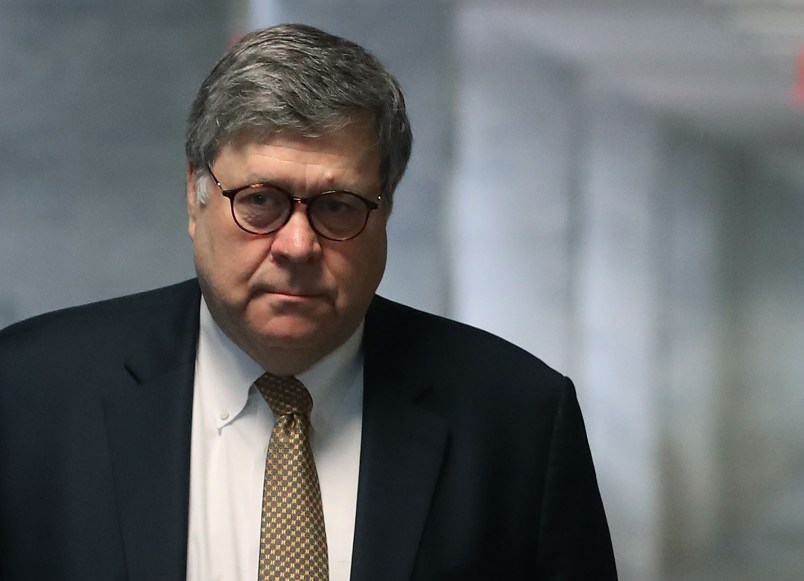The law, inserted into the 1994 crime bill after the Rodney King beating, had empowered past administrations to investigate police brutality and racial profiling. Trump’s first attorney general, Jeff Sessions, persistently bashed those efforts, and he sought to curb the consent decrees that kept police department’s feet to the fire. In the last three years, Justice Department action on systemic police misconduct has been sparse.
But the pandemic — and Attorney General Bill Barr’s stated eagerness to go after lockdown ordinances he believes are unconstitutional — has presented the administration another way to invoke the law.
The Justice Department has cited it in recent filings to back churches that had gone to court to fight local and state public health orders that curtailed their services.
So far, the Justice Department has only invoked the law to explain to courts why it was weighing in on lawsuits brought by private challengers. But the citations also seem in line with the more proactive approach Barr has hinted he’d like the Justice Department to take, as the law allows the department to itself launch investigations and bring lawsuits.
“The fact that they’re citing it, they seem to be laying a marker that they could say some of these police departments are systematically discriminating against religious institutions,” said Sasha Samberg-Champion, a former DOJ civil rights attorney. “They at least seem to be grasping some sort of authority that would allow them to do something on their own.”
The Justice Department did not respond to TPM’s inquiry about its invocations of the law in the COVID-19 cases.
‘This Is A Really Weird Way To Do It’
The statute in question is 34 U.S.C. section 12601, which authorizes the attorney general to bring civil lawsuits to remedy “pattern or practice“ by law enforcement entities that violate civil rights.
The way the Justice Department is using it now is “odd” and “peculiar,” former DOJ officials with section 12601 experience told TPM. They stressed, however, that cases where police officers are unfairly targeting Americans on the basis of their religion is well within the law’s scope.
“It’s just sign of the times and a sign of priorities that various administrations are going to focus on: whether it’s disproportionately targeting black and brown populations for policy, or whether its disproportionately targeting religious places of worship for policing,” said Julie Abbate, a former DOJ official who worked on section 12601 cases.
The law is typically used to investigate internal police department policies or repeated instances where local law enforcement is disproportionally cracking down on a particular group, be it related to race, religion or gender.
The two pandemic cases where the Justice Department has cited it recently were singular episodes, where local law enforcement agents were enforcing a coronavirus public health order against churches whose services allegedly violated the social distancing requirements of the order.
The Justice Department argued that because the orders carved out exceptions for other businesses but not for churches, the orders themselves could be a violation of religious rights.
The Trump administration made this argument in “statements of interest,” which are essentially “friend-of-the court” briefs the Justice Department has broad authority to file. In addition to citing that broad authority, the department cited section 12601 as why it was offering the court its take on the private lawsuits.
“If the DOJ was getting back into the business of enforcing pattern and practice violations of law enforcement entities, that, I think, would be a good thing,” said Justin Levitt, who worked in DOJ’s civil rights division during the Obama administration. “This is a really weird way to do it.“
This ostensible interest in holding police forces accountable for enforcing shutdown orders on churches is notable, former DOJ lawyers told TPM, given how DOJ’s political leaders under Trump have publicly downplayed and even mocked efforts to monitor systemic police misconduct. The administration’s record on “pattern and practice” cases is “anemic,” Chiraag Bains, a former DOJ attorney who now works at Demos, said.
“I found it ironic that they’re relying on this statute, given that they are doing precious little to enforce it.”
The Potential For ‘Harassing’
As the administration noted in its church case filings, section 12601 “allows the United States to bring suit when law enforcement officers engage in a pattern or practice that deprives individuals of their federal constitutional or statutory rights.”
Former DOJ officials were skeptical that the Justice Department would ultimately bring its own section 12601 lawsuits against COVID-19 orders, given how much time it takes for those cases to come together. But even an investigation, which section 12601 also authorizes, could have an “harassing” effect, Samberg-Champion warned, as the Justice Department could start “demanding information” from states and localities.
Other former DOJ officials pointed to the safeguards that are in place and the career attorneys who would be in charge of leading such investigations as a reason that the Justice Department wouldn’t go overboard trying to investigate state and local shutdown ordinances.
“I worry this is being used to harass in the press … that this gets covered with the notion that the DOJ might be coming after you,” Levitt said. “I am actually not worried about the DOJ coming after these local law enforcement agencies, because of all the homework they would have to do.”



